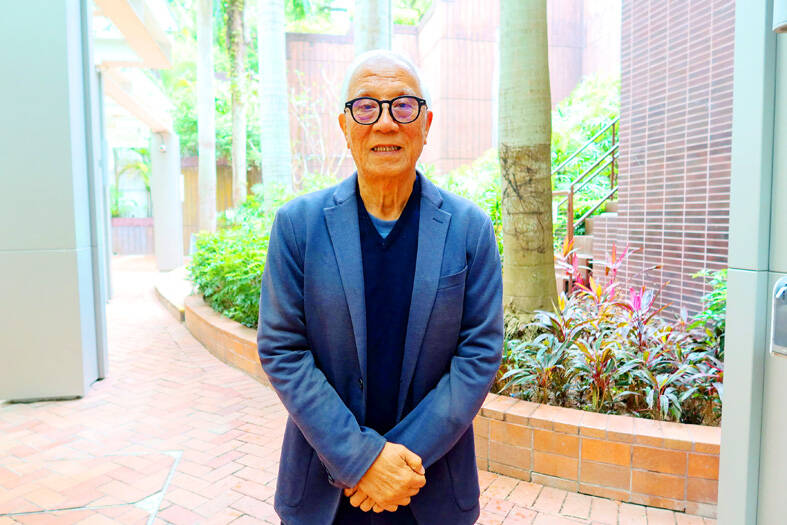Five senior members of Hong Kong’s Democratic Party, the territory’s biggest and last remaining major opposition party, said that Chinese officials or intermediaries have warned the party to disband or face serious consequences, including possible arrests.
The Democratic Party, which was founded in 1994 in the years before Hong Kong’s historic return from British to Chinese rule, has over the past few decades been the flagship opposition party that has united the territory’s democratic forces to push Beijing on democratic reforms and to uphold its freedoms.
Amid a years-long national security crackdown by China after pro-democracy protests in 2019, the Democratic Party is to hold an extraordinary general meeting tomorrow to seek members’ views and possibly pave the way for the group’s dissolution.

Photo: Reuters
Party Chairman Lo Kin-hei (羅健熙) has not given a concrete reason for the likely disbandment, but five senior Democratic Party members told Reuters they had been told in meetings with Chinese officials or people linked to Beijing in recent months that the party should close.
Fred Li (李華明), a veteran party member and former lawmaker, said a Chinese official had told him this should be done before the legislative elections in December.
“The meaning is that we should be gone by then,” Li said. “The message was very direct.”

Photo: Reuters
Li declined to identify the person, but said the tone was very different from frequent exchanges he has had with Chinese officials over many years.
There were no immediate responses to requests for comment from the Hong Kong Liaison Office, China’s main representative body in Hong Kong, or from the Hong Kong government.
Four other senior Democratic Party members also said they had been warned in recent months by middlemen linked to Beijing, some of whom said the party would face “serious consequences” if it did not disband. Three declined to be identified given the sensitivity of the matter.
Yeung Sum (楊森), one of the party’s founding members, said Beijing’s move in 2021 to overhaul Hong Kong’s electoral system to only allow “patriots” to run for public office had effectively marginalized the party by removing it from mainstream politics.
The party now holds no seats in Hong Kong’s legislature.
“We just keep a voice of advocacy for the people of Hong Kong on social and political issues, but still we are under pressure,” said Yeung, who was also approached by a middleman.
Two Asian and two Western diplomats say they are aware of the veiled threats to the Democratic Party.
“For a long time it seemed like Beijing could live with the situation of having the party around as a figment of opposition,” said one Western envoy.
“It seems they are leaving nothing to chance. The message is it is time to close down once and for all,” said the diplomat, who was not authorized to speak publicly.

ACTION PLAN: Taiwan would expand procurement from the US and encourage more companies to invest in the US to deepen bilateral cooperation, Lai said The government would not impose reciprocal tariffs in retaliation against US levies, President William Lai (賴清德) said yesterday, as he announced five strategies to address the issue, including pledging to increase Taiwanese companies’ investments in the US. Lai has in the past few days met with administrative and national security officials, as well as representatives from various industries, to explore countermeasures after US President Donald Trump on Wednesday last week announced a 32 percent duty on Taiwanese imports. In a video released yesterday evening, Lai said that Taiwan would not retaliate against the US with higher tariffs and Taiwanese companies’ commitments to

Intelligence agents have recorded 510,000 instances of “controversial information” being spread online by the Chinese Communist Party (CCP) so far this year, the National Security Bureau (NSB) said in a report yesterday, as it warned of artificial intelligence (AI) being employed to generate destabilizing misinformation. The bureau submitted a written report to the Legislative Yuan in preparation for National Security Bureau Director-General Tsai Ming-yen’s (蔡明彥) appearance before the Foreign Affairs and National Defense Committee today. The CCP has been using cognitive warfare to divide Taiwanese society by commenting on controversial issues such as Taiwan Semiconductor Manufacturing Co’s (TSMC, 台積電) investments in the

HELPING HAND: The steering committee of the National Stabilization Fund is expected to hold a meeting to discuss how and when to utilize the fund to help buffer the sell-off The TAIEX plunged 2,065.87 points, or 9.7 percent, to close at 19,232.35 yesterday, the highest single-day percentage loss on record, as investors braced for US President Donald Trump’s tariffs after an extended holiday weekend. Amid the pessimistic atmosphere, 945 listed companies led by large-cap stocks — including Taiwan Semiconductor Manufacturing Co (TSMC, 台積電), Hon Hai Precision Industry Co (鴻海精密) and Largan Precision Co (大立光) — fell by the daily maximum of 10 percent at the close, Taiwan Stock Exchange data showed. The number of listed companies ending limit-down set a new record, the exchange said. The TAIEX plunged by daily maxiumu in just

‘COMPREHENSIVE PLAN’: Lin Chia-lung said that the government was ready to talk about a variety of issues, including investment in and purchases from the US The National Stabilization Fund (NSF) yesterday announced that it would step in to staunch stock market losses for the ninth time in the nation’s history. An NSF board meeting, originally scheduled for Monday next week, was moved to yesterday after stocks plummeted in the wake of US President Donald Trump’s announcement of 32 percent tariffs on Taiwan on Wednesday last week. Board members voted to support the stock market with the NT$500 billion (US$15.15 billion) fund, with injections of funds to begin as soon as today. The NSF in 2000 injected NT$120 billion to stabilize stocks, the most ever. The lowest amount it